

Maneuvering the Islamist-Secularist Divide in the Arab World: How the United States Can Preserve its Interests and Values in an Increasingly Polarized Environment. U.S.

Army War College >> Strategic Studies Institute >> Publications >> Details Authored by Gregory Aftandilian. Brief Synopsis View the Executive Summary This monograph examines the Islamist-secularist divide in Arab countries, particularly in Egypt and Tunisia, and why it has become so intense and polarizing. You may also be interested in the following titles: The Frontman: Bono (In The Name of Power) by Harry Browne – review. Bono arriving for a visit to 10 Downing Street in March 2013.
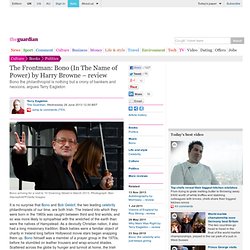
Photograph: Ben Stansall/AFP/Getty Images It is no surprise that Bono and Bob Geldof, the two leading celebrity philanthropists of our time, are both Irish. The Ireland into which they were born in the 1960s was caught between third and first worlds, and so was more likely to sympathise with the wretched of the earth than were the natives of Hampstead. As a devoutly Christian nation, it also had a long missionary tradition. Black babies were a familiar object of charity in Ireland long before Hollywood movie stars began snapping them up. Besides, if you were born into this remote margin of Europe and yearned for the limelight, it helped to have an eye-catching cause and a mania for self-promotion. Bono belongs to the new, cool, post-political Ireland; but by turning back to the old, hungry, strife-torn nation, now rebaptised as Africa, he could bridge the gap between the two. Browne's case is simple but devastating. On Mona El Tahawy and ‘Native Informants’
The problem with Tahawy’s article , as others have pointed out, is that she attempts to depoliticize the patriarchy and make it about emotion –hatred–because, you know, Arabs are all ‘hot-blooded’ and whatnot.
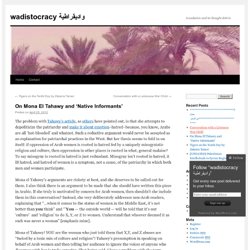
Such a reductive argument would never be accepted as an explanation for patriarchal practices in the West. But her thesis seems to fold in on itself: if oppression of Arab women is rooted in hatred fed by a uniquely misogynistic religion and culture, then oppression in other places is rooted in what, general malaise? To say misogyny is rooted in hatred is just redundant. Misogyny isn’t rooted in hatred, it IS hatred, and hatred of women is a symptom, not a cause, of the patriarchy in which both men and women participate. Mona el Tahawy’s arguments are rickety at best, and she deserves to be called out for them.
Mona el Tahawy! Like this: Like Loading... Our own Orientalism: Why Medievalists are Complicit when Manuscripts Burn and Ruins Crumble. (Modern Medieval is pleased to host this guest post by Prof.
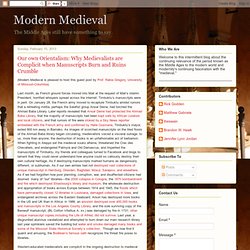
Rabia Gregory, University of Missouri-Columbia) Last month, as French ground forces moved into Mali at the request of Mali’s interim President, horrified whispers spread across the internet: Timbuktu’s manuscripts were in peril. On January 28, the French army moved to recapture Timbuktu amidst rumors that a retreating militia, perhaps the Salafist group Ansar Deine, had torched the Ahmad Baba Library. Later reports revealed that Ansar Deine had protected the Ahmad Baba Library, that the majority of manuscripts had been kept safe by African curators and local citizens, and that rumors of fire were stoked by a Sky News reporter embedded with the French army and confirmed by Hallè Ousmane, Timbuktu’s mayor, exiled 800 km away in Bamako.
Our own orientalism has significant consequences for the academic study of the medieval world and the preservation of medieval artifacts. India: Land of sweet, smiling women - and awful surprises. By Liz Jones Column PUBLISHED: 22:13 GMT, 5 January 2013 | UPDATED: 22:13 GMT, 5 January 2013 When I met my husband, a large part of the attraction was that he was Indian.
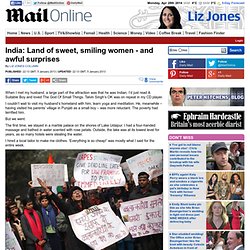
I’d just read A Suitable Boy and loved The God Of Small Things. Talvin Singh’s OK was on repeat in my CD player. I couldn’t wait to visit my husband’s homeland with him, learn yoga and meditation. But we went. The first time, we stayed in a marble palace on the shores of Lake Udaipur. I hired a local tailor to make me clothes. Hirsi Ali, Berman, and Ramadan on Islam. Was the prophet Muhammad a pervert and a tyrant?
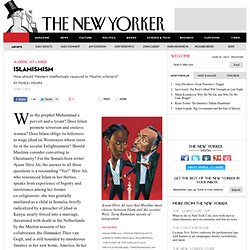
Does Islam promote terrorism and enslave women? Does Islam oblige its followers to wage jihad on Westerners whose roots lie in the secular Enlightenment? Should Muslims consider converting to Christianity? For the Somali-born writer Ayaan Hirsi Ali, the answer to all these questions is a resounding “Yes!” Hirsi Ali, who renounced Islam in her thirties, speaks from experience of bigotry and intolerance among her former co-religionists: she was genitally mutilated as a child in Somalia, briefly radicalized by a preacher of jihad in Kenya, nearly forced into a marriage, threatened with death in the Netherlands by the Muslim assassin of her collaborator, the filmmaker Theo van Gogh, and is still hounded by murderous fanatics in her new home, America. She is not hopeful that Americans will heed her warning.